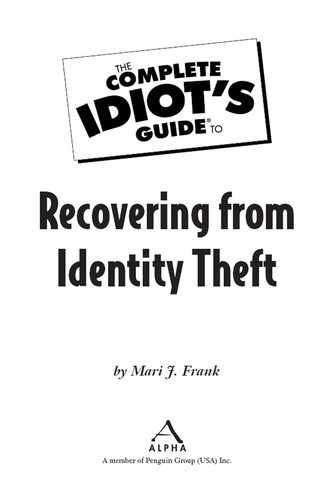Your Rights as a Victim
As a victim of identity theft, it’s vital to remember that you have rights, for two reasons. First, having steps that you are legally entitled to take that can improve and eventually right the situation will be a real comfort for most victims of financial fraud. Believe me, I know. When I was victimized in 1996, there were no laws that protected identity-theft victims. I had to discover how to fix my own problem. Afterward, I got involved and even helped write and testify for the laws that protect you today. You may feel like you’re lost in the woods, uncertain of where you are, but this book will be like a map and compass to guide you to safety.
The second reason is that you may find that the staff at collection agencies, creditors, banks—even some law-enforcement agencies—don’t know the law or your rights. Understanding your rights is the best way to educate those who can help you to get what you need and deserve. What follows is a summary of those rights. The rest of the book is about how to put them into action for you.
Your Rights and Credit
The major tool you have under federal law is the Fair Credit Reporting Act (FCRA), which was amended by the Fair and Accurate Credit Transactions Act (FACTA) in 2003, which really addressed identity theft for the first time. Here’s what it guarantees you, both in terms of creditors and credit-reporting agencies (CRAs):
♦ By phone you can place a fraud alert on your CRA credit files for 90 days. You can make a written request to extend a fraud alert for up to seven years.
♦ You have the right to two free credit reports in the year after you file an extended alert, and the credit bureaus must provide you your file not more than three business days after your request. All consumers are entitled to an annual free disclosure of your consumer report from each of the three credit-reporting companies and other specialty consumer reporting agencies. The specialty consumer reporting agencies provide a range of information on people, including check-writing history, employment history, insurance claims, medical history, and tenant history.
♦ For five years from the date you write and request an extended alert, the consumer credit-reporting agencies must exclude you from any consumer lists it prepares and gives to any third party to offer pre-screened credit or insurance; you can opt out of unsolicited credit and insurance offers based on CRA-provided information by calling 1-888-5-OPT-OUT (more details in Chapter 4).
♦ You can dispute fraudulent information in your credit report and the CRAs must block fraudulent information from displaying in your credit report, once you identify that information as fraud by providing an identity-theft report. The data cannot be reinserted in your file unless the creditor verifies to the CRA that the information was indeed correct.
♦ Any business or agency that created a fraudulent account for an identity thief is required to give you all documentation about transactions that the thief undertook and provide it to your law-enforcement agency within 30 days at no cost.
♦ Collection agencies must stop their collection activity when you tell them that a debt is fraudulent, notify the original creditor, and send you (on request) all information about the debt so you can dispute it.
♦ A creditor may not sell a debt to collections after it is notified that the debit was due to fraud. If a collection company is notified by a victim that a debt is fraudulent, the collection company must stop collections, notify the original creditor, and, upon request of the victim, provide all information about the debt in order to dispute it.

Legal Lingo
A credit-reporting agency (CRA) is a company that collects credit information on consumers and sells that information, in the form of credit reports, to other companies, landlords, lenders, potential employers, and others. The three main CRAs are Trans Union, Experian, and Equifax.
I’ll cover how to use these rights and others for you in reclaiming and restoring your identity throughout the rest of this book.
Your Rights and Law Enforcement
Under the FCRA, you will need to present an identity-theft report from any law-enforcement agency. Given federal statutes and the laws of most states, identity theft is a crime and you have a right to ask any local, state, or federal law-enforcement agency to file an identity-theft report on your behalf.
Unfortunately, some local agencies are reluctant to issue an identity-theft report, because they don’t have the resources to investigate. The FBI or Secret Service, who have jurisdiction for these crimes, will not investigate unless there are dozens of victims from a particular impostor (in other words, a large security breach) or unless there is a very high dollar value. So those agencies may send you to local law-enforcement agencies, which may be understaffed, overwhelmed with cases, or not willing to see you as a victim, since often the credit-card companies are still considered the real victims. Your local postal inspector or Social Security inspector, as federal agents, have the authority to give you an identity-theft report, but often are so busy that they will refer you to local police. You may also ask for a report from your Department of Motor Vehicles.
Federal law, as do most state penal codes, entitles you to be recognized as a victim (18 USC 1028), and you must have an identity-theft report to clear your name, so don’t give up if an agency refuses to give you one. Call the managing officer of the agency. If all else fails, call the Federal Trade Commission at 1-877-ID-THEFT to ask for assistance.
No matter what, you have the right to politely ask for an informational report that will include your documentation of the fraudulent activity and phony addresses. You have this right because identity fraud is a crime under both federal and state law. (See the next section for more on state laws.) There may be multiple federal law-enforcement agencies you can contact as well. Chapter 3 has detailed help on how to file reports with law enforcement.
You also have rights if the identity thief used your name or Social Security number when arrested, creating a criminal record under your name:
♦ You have a right to your own copy of the (fraudulent) criminal record in your name, including the booking records, court documents, and state and federal database records from the courts and from the National Crime Information Center (NCIC).
♦ You can file an impersonation report and identity-theft report.
♦ You can have the police confirm your identity and help you prove that you are not the impersonator. You can request that the law-enforcement agency issue you a clearance letter.
♦ You can ask the appropriate district attorney to amend any complaint against you and have the law-enforcement agency correct all its records.
♦ You have the right to have the courts correct all their records.
♦ You have the right to correct background checks showing the arrests/convictions with consumer reporting agencies.
Chapter 15 covers all this in detail.
Other Federal Identity Theft and Privacy Laws
A number of laws also provide you certain rights as a victim of identity theft. The Fair Credit Reporting Act (FCRA, 15 USC §§1681 to 1681u) regulates consumer reports and consumer-reporting agencies. Section 5 of the Fair and Accurate Credit Transactions Act (FACTA), an amendment to the FCRA, specifically addresses identity theft and related consumer issues. Victims of identity theft are granted the ability to work with creditors and credit bureaus to remove negative information in their credit report resulting from identity theft. FACTA also enables consumers to place three different types of fraud alerts intended to stop credit grantors from opening any new accounts.
The Gramm-Leach-Bliley Act (GLBA), also known as the Financial Services Modernization Act of 1999, provides limited privacy protections against the sale of consumer financial information, including “Fraudulent Access to Financial Information.”
The Truth in Lending Act limits liability for fraudulent credit card charges to $50.00, in most situations. It also requires “meaningful disclosure” of key information in any consumer-credit transaction.
The Fair Credit Billing Act establishes procedures for resolving billing errors or fraud on credit-card accounts when the consumer reports such unauthorized activity within certain time frames.
The Electronic Fund Transfer Act provides a basic framework of the rights, liabilities, and responsibilities of parties involved in making electronic fund transfers. It grants identity-theft rights when using electronic transfers including debit cards for financial transactions.
The Health Insurance Portability and Accountability Act of 1996 (HIPAA) requires healthcare providers and insurers to create and maintain electronic patient records, in order to improve confidentiality and efficiency. A patient has certain privacy rights; however, a provider does not need consent to disclose patient information for situations involving treatment, payment, and healthcare operations. HIPAA also mandates a duty to disclose security breaches to affected individuals. It also allows patients to dispute errors like identity fraud. See Fact Sheet 8a regarding HIPAA at www.privacyrights.org.
In the United States, privacy and identity-theft issues are also within the jurisdiction of the states. Your state of residence may have laws that grant you additional rights.
Contact your state’s Attorney General’s office and ask about identity-theft victim’s rights. For contact information, check with the National Association of Attorneys General (www.naag.org). There is a map on the home page with links to contact information for each state’s AG.
The site LLRX.com has a good collection of state identity-theft victim resources. Go to www.llrx.com and search for identity-theft rights. Also see the National Conference of State Legislators at www.ncls.org and search for identity theft.
The Least You Need to Know
♦ Identity theft may manifest in ways other than credit. Anything you can do with your identity can be done by impostors.
♦ It is easy for thieves to get enough personal information about you to pretend to be you. No one is immune.
♦ You must take steps to verify whether you are an identity-theft victim, and then prove your innocence.
♦ You have some powerful legal rights as a victim that will help you clear your name.
..................Content has been hidden....................
You can't read the all page of ebook, please click here login for view all page.
